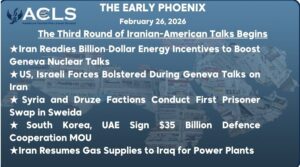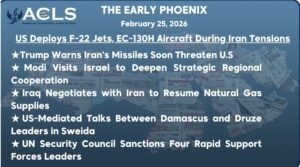
★ SYRIA
-
U.S. Military Reinforcements Arrive in Northeastern Syria
A U.S. cargo plane carrying military equipment, logistics supplies, and troops landed at Khirab al-Jir base in northeastern Syria’s Rmelan area on Saturday evening, accompanied by two helicopters patrolling the skies, according to the Syrian Observatory for Human Rights. The London-based Observatory reported on Sunday that the International Coalition forces brought additional military reinforcements on Friday. Over 60 trucks, in two separate convoys, entered through the al-Waleed crossing, delivering armored vehicles, heavy artillery, and military equipment to the Khirab al-Jir base in al-Hasakah countryside.
-
Syrian Rebel Government Blocks Iranian Flights Over Airspace
The Syrian rebel regime, led by (Abu Muhammad al-Julani), has banned all Iranian flights over Syrian airspace, extending the initial restriction on military missions to include civilian aircraft. Security sources view this as a pivotal shift in Syria’s alignment, moving away from the ‘Axis of Evil’ under the influence of Turkey and Qatar. The policy change is expected to impact relations not only with Iran but also with Shiite allies like Hezbollah in Lebanon.
-
Saudi Delegation Engages Syrian Leader on Developmental Cooperation
A Saudi delegation, led by a Royal Court advisor, met with Syrian leader Ahmed Al-Sharaa at the People’s Palace on Sunday. Al-Sharaa, in an earlier interview with Asharq Al-Awsat, praised Saudi Arabia and Gulf nations for their advancements and expressed aspirations to replicate such progress in Syria. He emphasized opportunities for cooperation in economic and developmental sectors, aiming to align goals for mutual benefit.
-
Israeli Forces Secure Positions in Syria, Clash with Protesters
Israeli forces established seven permanent military posts along Syria’s disengagement line, spanning Damascus, Daraa, and Quneitra, Al-Mayadeen reports. The strategic locations, including Mount Hermon and the Yarmouk Basin, grant oversight of Damascus and surrounding regions. Israel now controls 500 square kilometers of Syrian territory, seizing key water resources like the Sahm Golan Dam and Yarmouk riverbed while dismantling Syrian military sites. On Friday, tensions escalated as Israeli forces fired on protesters in Maariya village, injuring Maher Al-Hussein during a rally against land encroachment.
-
Syria’s New Leadership Announces Interim Cabinet and Centralized Military Control
Syria’s new leadership, led by Ahmed Al-Sharaa, continues shaping its interim government, appointing Murhaf Abu Qasra, known as Abu Hassan 600, as defense minister. Abu Qasra, a key commander in Hayat Tahrir al-Sham, played a central role in the campaign that ousted Bashar al-Assad. Sharaa announced on Sunday that all weapons in Syria, including those held by Kurdish-led forces, will be centralized under state control. During meetings with armed factions and regional leaders, Sharaa emphasized restructuring Syria’s military institution and pledged to end external interference, signaling a push for stability and sovereignty in the post-Assad era.
-
Syria’s New Leadership Establishes Women’s Affairs Office, Pledges Minority Protection
Syria’s interim leadership, under Ahmad Al-Sharaa, announced the creation of a Women’s Affairs Office, led by humanitarian activist Aisha Al-Debs. This step, part of forming provisional institutions, responds to international calls following the fall of Bashar al-Assad. Al-Sharaa also emphasized protecting minorities and fostering coexistence in Syria’s diverse society, vowing to shield sects from internal and external threats of discord. He affirmed, “Syria is a country for all, and we can coexist together.”
-
Four-Year Plan Led to Assad Regime’s Rapid Collapse
A detailed Washington Post report revealed the rapid collapse of Bashar al-Assad’s regime was a result of years of planning by opposition forces. Citing sources from armed factions, Western and Turkish officials, and individuals close to Assad, the report highlights that Hayat Tahrir al-Sham began preparing the operation four years ago. According to HTS member Musa Al-Assad, the group quietly built alliances with other factions, enhanced its military capabilities, and developed weapons production to launch a counterattack that shifted the balance of power on the ground.
============
★ ISRAEL
-
Israel Establishes First Combat Unit For Religious Women
Israel formed its first combat unit for religious women to address soldier shortages due to regional conflicts. Sparked by the October 2023 Hamas attack, the initiative reflects increased Orthodox interest in military roles. The unit includes religious advisors and undergoes eight months of training, led by female officers to maintain religious practices. This shift integrates Orthodox women into combat while balancing cultural traditions, marking a significant adaptation in Israel’s military structure to meet growing security demands.
-
Israel Strengthens Air Defenses Following Yemeni Missile And Drone Attacks
Israel bolstered air defenses after a Yemeni missile struck Tel Aviv’s Jaffa, injuring six and causing extensive damage. Another Houthi missile hit a Ramat Efal elementary school in Ramat Gan, causing $10.8 million in damages, including nearby buildings. Hours later, a Yemeni drone breached Israeli airspace near Gaza but was intercepted by an IDF helicopter. These attacks, alongside an Iranian missile strike in October causing $13.5 million in damages, highlight escalating threats to central Israel, severely impacting infrastructure and recovery efforts.
-
“One Result Only” Netanyahu Vows Strong Action Against Houthi Attack
Israeli Prime Minister Netanyahu vowed after a missile strike from Yemen hit near Tel Aviv, injuring strong action against the Houthis 14 people. Despite failed interception attempts, Netanyahu promised retaliation, comparing it to Israel’s response to other terror groups. He urged citizens to stay patient, vigilant, and follow defense instructions. Houthi attacks continue disrupting maritime traffic in the Red Sea and Gulf of Aden, affecting global trade, while Israel and the U.S. carry out military responses.
-
Israel Warns Syria Against Jihadist Threat, Strengthens Buffer Zone Security
Israel warned Syria’s leader against allowing jihadist movement into the southern region, citing defense concerns and past threats. Israel reaffirmed its buffer zone presence, establishing seven positions near Damascus, Daraa, and Quneitra to counter risks following Assad’s regime collapse. Security Cabinet discussions emphasized vigilance over Syria’s evolving situation, while Israel urged adherence to the 1974 disengagement agreement. These measures aim to prevent instability, ensure regional security, and deter potential incidents similar to October 7, 2023.
===============
★ LEBANON
-
Lebanon Pursues Syrian Regime Officials Following U.S. Interpol Request
U.S. Interpol urged Lebanon to arrest Jamil Hassan, Syria’s Air Intelligence Chief, for war crimes involving barrel bombings. Lebanese authorities detained 21 former Syrian officers and soldiers, some carrying large sums of money, after entering illegally. Investigations suggest Syrian regime fugitives are hiding in Lebanon via unauthorized routes. Security forces remain on alert, with the prosecutor ordering Hassan’s arrest if located, signaling intensified efforts to address fugitives linked to Assad’s fallen regime.
-
Lebanese Army Takes Control of Military Sites Held by Pro-Assad Palestinian Factions
The Lebanese Army has seized key military sites in eastern Lebanon previously controlled by Palestinian factions loyal to the former Assad regime. These include the Sultan Yacoub and Hishmesh centers, as well as the Halaweh camp. The army also confiscated weapons and military equipment during the operation. This action follows the fall of the Assad regime, signaling a shift in Lebanon’s security situation as the army ensures stability and state control.
-
Jumblatt’s First Visit to Syria in 15 Years for Talks
Walid Jumblatt, former leader of Lebanon’s Progressive Socialist Party, visited Syria after 15 years, meeting interim leader. Jumblatt called for restoring diplomatic relations and accountability for past crimes. Al-Sharaa emphasized Syria’s commitment to Lebanon’s security and sovereignty. The visit marked a shift in Jumblatt’s stance toward Syria, moving from past criticism to advocating for cooperation following the Syrian regime’s recent downfall.
===============
★ ISRAEL-HAMAS WAR
-
Hamas Releases Rare Video of Sinwar, Haniya, and Al-Arouri Together
Hamas’s Al-Qassam Brigades released a rare video featuring leaders Yahya Sinwar, Ismail Haniya, and Saleh Al-Arouri. The footage shows these leaders together for the first time, with Sinwar discussing the Gaza war and Haniya humorously calling him “Israel’s number one enemy.” The video coincides with growing optimism for a ceasefire agreement among Hamas, Islamic Jihad, and the Popular Front. Key issues remain over Israel’s terms, but negotiations are progressing toward a potential ceasefire.
-
Hamas Confirms Hostage Signs Of Life During Negotiations With Israel
Hamas provided signs of life for several hostages during Qatar-mediated talks. Israel requested the release of 34 hostages, including 11 men classified as soldiers, in exchange for 250 Palestinian prisoners. The deal prioritizes children, female soldiers, and elderly or sick captives. Israel rejected ending the war, favoring a prolonged ceasefire. Egyptian and Qatari mediators are working to finalize the agreement, marking progress in resolving key issues surrounding the hostages and potential prisoner exchanges.
-
Israel Agrees to Release 200 Palestinians, Excludes Marwan Barghouthi
Israel agreed to release 200 Palestinians sentenced to life imprisonment, excluding Marwan Barghouthi. Disagreements remain over the release of specific prisoners, with Israel demanding veto power over 65 individuals. While ceasefire talks progress, Hamas views Israel’s demands as obstacles to a deal. Israel is considering a partial prisoner exchange instead of a comprehensive agreement before President Biden’s term ends. Key unresolved issues include the Rafah crossing and the return of displaced persons, complicating the Gaza ceasefire negotiations.
-
Netanyahu Vows No Gaza War End Until Hamas Removed
Prime Minister Benjamin Netanyahu declared the Gaza war will not end until Hamas is dismantled and removed from power. He emphasized sovereignty, rejecting temporary deterrent measures and addressing U.S. pressure against entering Rafah. Netanyahu criticized delays in military aid but praised U.S. support, including defense against Iranian missiles. He highlighted intelligence failures on Hezbollah and reaffirmed Israel’s commitment to eradicating threats, framing Hamas’ elimination as essential for Israel’s survival and long-term regional security.
-
Gaza Resistance Groups Intensify Tactical Strikes Against Israeli Forces
Al-Quds and Al-Qassam Brigades released footage documenting strategic ambushes against Israeli forces in northern Gaza. Al-Quds leveraged drone-captured coordinates to detonate “Thaqib” and “Raad” explosives near Khazandar, targeting vehicles and six soldiers, causing casualties and evacuations by helicopter. Al-Qassam operations in Jabalia included an anti-tank missile destroying a Merkava tank, an armored carrier hit, and a sniper injuring a soldier. Both groups highlighted civilian harm caused by Israeli forces and vowed continued resistance, inflicting significant losses in ongoing battles.
-
Israeli Strikes Kill 28 Palestinians, Intensify Gaza Devastation
Israeli airstrikes killed 28 Palestinians, including children, targeting homes, vehicles, and a school sheltering displaced families. A strike on Deir al-Balah destroyed a three-story building, killing 13 family members. Kamal Adwan Hospital was heavily shelled, leaving evacuation efforts impossible. The ongoing conflict, displacing millions and causing over 45,000 deaths, continues as ceasefire talks stall, with no resolution in sight.
============
★ TURKIYE
-
Turkey Gains U.S. Exemption for Gas Payments, Revises Forecasts
Turkey received a U.S. exemption for Gazprombank sanctions, ensuring uninterrupted payments for Russian gas, which supplies over 50% of its imports. Last year, 21.1 billion cubic meters were delivered, which is crucial for Turkey’s energy needs. Hungary also obtained a waiver for Russian energy transactions. Turkey’s central bank revised inflation forecasts to 45.25%, adjusted the 2025 account deficit to $18 billion, and projected the lira’s year-end exchange rate to 35.30 against the dollar, reflecting economic recalibrations.
-
U.S. Backs SDF, Turkey Rejects Kurdish Presence In Syria’s Future
The U.S. reaffirmed support for the SDF to counter ISIS, highlighting its role in guarding ISIS prisons and ensuring stability. Turkey, however, rejects Kurdish militants’ presence, urging SDF dismantlement and demanding the U.S. cease support. Following Assad’s collapse, Turkey and its allies seized Manbij, escalating clashes with SDF. Turkey insists Syria’s new leadership will expel Kurdish forces. The U.S. military confirmed 2,000 troops in Syria, double earlier figures, underscoring ongoing regional involvement and tensions.
-
Turkey Warns Syria Over Kurdish Militants, Threatens Military Action
Turkish Foreign Minister Hakan Fidan warned of decisive action if Syria’s new administration fails to address Ankara’s security concerns over the U.S.-backed SDF and YPG, viewed as PKK extensions. Following Assad’s ouster, Turkey seized Manbij from SDF forces. Fidan urged disbanding YPG, maintaining Syria’s territorial integrity, and warned of necessary military measures to safeguard national security. He criticized increased U.S. troop presence and reiterated opposition to foreign bases in Syria, emphasizing Turkish-Syrian cooperation against terrorism.
-
Boeing Secures $36 Billion Turkish Deal, Largest In 2024
Boeing won a $36 billion order from Pegasus Airlines for 100 Boeing 737 Max 10 planes, with an option for 100 more. Deliveries begin in 2028, marking the largest order in Pegasus’ history and Boeing’s biggest deal of 2024. The agreement signifies a major victory over Airbus and strengthens Boeing’s recovery from strikes and challenges, solidifying its position in the aviation market.
-
Turkish Foreign Minister Meets Syria’s New Leader, Urges Stability
Turkish Foreign Minister Hakan Fidan met Syria’s new leader, in Damascus, emphasizing dismantling the PKK/YPG, restoring sovereignty, and lifting sanctions. Discussions included rebuilding Syria, unifying governance, and enabling displaced citizens’ voluntary return. Fidan condemned Israel’s actions, urging respect for territorial integrity and global cooperation. Both leaders highlighted strategic ties, peaceful coexistence, and reconstruction efforts, marking Syria’s recovery after Assad’s removal. Türkiye reaffirmed its support for Syria’s brighter, secure, and prosperous future.
============
★ IRAN
-
Iranian Dissidents Claim Tehran Recruits Children For European Attacks
Iran allegedly recruits minors and local criminals to target Jewish and Israeli sites in Europe, escalating covert operations. Bloomberg reported incidents linking Iran’s secret actions in Europe to its broader conflict with Israel and regional proxies. European governments express concern over rising tensions fueled by these operations amid societal divisions related to migration.
-
Tehran Races To Rebuild Ties With Syria’s New Leadership
Iran seeks to regain influence in Damascus after losing ground following Assad’s fall, prioritizing ties with Syria’s new leadership. Iranian diplomats, distancing themselves from Assad, expressed disappointment over his unwillingness to compromise, highlighting Iran’s strategic focus on maintaining regional influence.
-
Khamenei Denies Iran Has Proxies In The Region
Ayatollah Khamenei rejected claims of Iran using regional proxies, asserting that Iran independently undertakes its actions without intermediaries. Speaking to religious chanters, he labeled assertions of lost influence as false and criticized U.S. and Israeli rhetoric following events in Syria.
-
Senior IRGC Commander Killed By Syrian Army Officer
New reports reveal Quds Force commander Qiomarth Pourhashemi was killed by a Syrian officer during a joint operations meeting in Aleppo. Earlier, Iranian media attributed his death to opposition forces. CGTN reported an Iranian security source confirming the incident, which occurred during rebel advances near Aleppo.
-
Trump Reportedly Offered Iran High-Level Nuclear Talks
Iraqi media revealed President-elect Trump proposed nuclear negotiations with Iran via Oman, expressing readiness for a potential new agreement. A source close to Iranian President Masoud Bazshakian confirmed the proposal included discussions on nuclear issues, though the report remains unverified by other outlets.
-
Iran Faces Escalating Energy Crisis With Prolonged Blackouts
Iran’s gas crisis deepens, forcing infrastructure closures and power cuts nationwide. Last week, Iranian electricity authorities warned producers of widespread outages lasting days or weeks. Government offices reduced operations, roads and malls went dark, and factories halted production due to electricity shortages. President Masoud Bazshakian warned the country’s infrastructure issues have reached a critical breaking point.
-
Iran’s Exports To D-8 Countries Surge By 24%
Iran’s exports to D-8 nations grew by 24%, reaching $6.317 billion and 13.6 million tons between March and November. Exports by weight increased 26%, with Turkey leading as the top importer, accounting for 9.4 million tons worth $4.4 billion. Pakistan and Indonesia followed as major importers. The D-8, founded in 1997, includes Iran, Turkey, Pakistan, Bangladesh, Indonesia, Malaysia, Egypt, and Nigeria, aiming to boost economic, scientific, and technological cooperation among member states.
-
Iran’s Diesel Production Reaches 125 Million Liters Daily
Iran’s daily diesel production increased by 15 million liters in four months, reaching 125 million liters, according to the National Iranian Oil Refining and Distribution Company. Deputy Oil Company Chief Mohammad Ali Dadvar projected an additional three million liters of Euro 5 diesel with new Abadan refinery units operational within two months, potentially boosting daily output to 128-130 million liters.
============
★ IRAQ
-
Iraq Halts Oil Exports to Syria, Escalating Fuel Crisis
Iraq suspended crude oil exports to Syria on December 17, citing regional instability, halting shipments of 120,000 tonnes per month, according to Iraqi MP Mustafa Sanad. The decision coincides with the Syrian Democratic Forces (SDF) stopping oil deliveries to areas under the Syrian transitional government’s control. Syria is facing a worsening fuel crisis, with soaring prices and limited petrol station supplies, exacerbated by transport disruptions due to security concerns.
-
Iraq and Oman Strengthen Ties Amid Syrian Crisis and Diplomatic Collaboration
Omani Foreign Minister Badr Al-Busaidi and Iraqi counterpart Fuad Hussein discussed the Syrian crisis, emphasizing diplomacy to resolve regional conflicts. Hussein expressed concern over growing “terrorist groups” in Syria and the need for an inclusive political process. Both ministers reaffirmed their countries’ historical ties, focusing on Palestinian issues and enhancing bilateral trade. They signed two memorandums of understanding during the ninth Joint Iraqi-Omani Committee session in Baghdad, aiming to strengthen political collaboration and diplomatic studies.
-
Iraq’s “Sayed al-Shuhada Brigades” Halts Attacks, “Al-Fatah” Rejects PMU Dissolution
The Sayed al-Shuhada Brigades, part of the “Axis of Resistance,” halted its attacks on Israel due to shifting circumstances, emphasizing its commitment to “unity of the front.” The Al-Fatah coalition, led by Hadi al-Ameri, rejected calls to dissolve the Popular Mobilization Forces (PMF), highlighting their crucial role in Iraq’s defense. Tensions rise over potential Israeli strikes on Iraqi factions, yet the Iraqi government and religious leaders firmly oppose PMU dissolution, reinforcing the PMF’s importance to national security.
============
★ YEMEN
-
Missile from Yemen Hits Tel Aviv, Injures 16
The Israeli army reported Saturday that a missile fired from Yemen struck central Tel Aviv after interception attempts failed, injuring 16 people with minor wounds. Army spokesperson Avichay Adraee confirmed via “X” that alarms were activated, and details of the incident are under investigation.
-
Houthi Leaders Flee Sanaa Due to Israeli Threats
Dozens of Houthi political and military leaders have reportedly left Sanaa for Saada, Hajja, Amran, and Hodeidah, according to Al-Arabiya/Al-Hadath sources. The move comes as a precautionary measure following Israeli warnings, anticipating potential direct Israeli or U.S. strikes.
-
Yemen Engages with New Syrian Authorities to Reclaim Embassy
Yemen’s Foreign Ministry announced on Saturday via “X” that it is in contact with Syria’s new authorities to reclaim its embassy building in Damascus. A ministry official stated that the embassy would resume operations immediately after regaining the premises, which the former Syrian regime had refused to hand over.
-
Houthis Report $313 Million Losses from Israeli Airstrikes
The Houthi militia admitted over $313 million in losses at Hodeidah ports due to three Israeli airstrikes since July. The attacks targeted Hodeidah, Salif, and Ras Issa ports. The figures were revealed by Houthi Transport Minister Mohammed Qahim during a press conference with militia leaders and the UN Mission to Support the Hodeidah Agreement (UNMHA), addressing the strikes’ impact on vital port infrastructure.
-
Missing Yemeni Officer Found in Syria After 11 Years
Hassan Mohammed Yahya Al-Wuhaib, a Yemeni officer missing in Syria since 2012, was found in a Damascus hospital in poor physical and mental health. The American Center for Justice (ACJ) confirmed the discovery, crediting Yemen’s embassy in Amman for coordinating with Syria’s transitional government. The ACJ urged swift repatriation of Al-Wuhaib, provision of necessary care, and continued efforts to locate the four remaining missing Yemeni officers. This development follows the fall of Bashar al-Assad’s regime two weeks ago.
-
Houthis Claim Attack on US Aircraft Carrier After Airstrikes in Yemen
The Houthis announced targeting the US aircraft carrier Truman and its escorts on Sunday, following precise American airstrikes on Houthi facilities in Sanaa. The strikes hit a missile storage site and a command center in Atran and Jabal Nuqum, according to US Central Command (CENTCOM), which also reported downing several Houthi drones and an anti-ship missile over the Red Sea. Earlier, the Houthis accused the US and UK of bombing Houthi positions in Yemen’s coastal province of Hodeidah.
=============
★ GULF NATIONS
-
Gulf Markets Drop Due to Concerns Over Rate Cut Pace
Most Gulf stock markets declined on Sunday due to concerns about the U.S. Federal Reserve slowing the pace of interest rate cuts in 2025. The Fed’s revised inflation projections, signaling persistently high inflation, added to the uncertainty. However, lower-than-expected November inflation data helped limit losses. Traders now anticipate two rate cuts in 2024, with the first in March and the second by October.
-
Qatar Threatens to Halt Gas Exports to Europe Over New Tax
Qatar’s Energy Minister Saad Al-Kaabi warned of halting gas exports to the EU if new labor and environmental tax laws are imposed. Speaking to the Financial Times, Al-Kaabi emphasized that a 5% revenue loss for QatarEnergy translates to a 5% hit to Qatar’s national income, stating, “If this costs 5% of revenues, I won’t sell to Europe. I’m serious about this.”
-
Kuwait and India Announce Strategic Partnership and Cooperation Agreements
Kuwait and India agreed on Sunday to elevate bilateral ties to a strategic partnership, signing agreements in defense, sports, and cultural cooperation. The announcement followed Indian Prime Minister Narendra Modi’s two-day visit to Kuwait, where he met with Emir Sheikh Mishal Al-Ahmad Al-Sabah and senior officials. A joint statement emphasized that the partnership builds on the nations’ strong traditional ties, aiming to deepen cooperation across all sectors to benefit both countries and their peoples.
-
Qatar’s Local Liquidity Rises to $202 Billion in November
Qatar’s central bank reported a 0.27% monthly increase in local liquidity for November, reaching 735.5 billion Qatari riyals ($202.57 billion). The growth was driven by a 0.88% rise in foreign currency deposits, exceeding 258 billion Qatari riyals ($71.06 billion), according to monetary data.
============
★ EGYPT & North Africa
-
Egyptian Army Prioritizes Acquiring Advanced Aircraft Systems
The Egyptian army emphasized equipping its air force with cutting-edge aircraft systems to address challenges and align with technological advancements. During a visit to an airbase, Defense Minister Abdel Meguid Saqr praised the air force as a pivotal arm of Egypt’s military, capable of executing strategic missions nationwide. Senior military leaders, including Chief of Staff Ahmed Khalifa, attended the event.
-
U.S. Approves $5 Billion Arms Sale To Egypt
The U.S. Department of Defense announced State Department approval for a $5 billion arms sale to Egypt, primarily focused on Abrams tank upgrades worth $4.69 billion. Additional sales include Hellfire missiles valued at $630 million and precision weapon systems for $30 million, with General Dynamics Land Systems as the primary contractor.
-
$121 Billion Secured For Trade And Investment In 2023
The Arab Investment and Export Credit Guarantee Corporation reported $260 billion in insurance commitments for Arab region trade, investment, and exports by 2023. This marks a 7% increase, representing 8% of the global total. Commitments include 83% for export credit insurance, 8% for political risk coverage valued at $22 billion, and 9% for cross-border operations.
-
Morocco Mediates For Niger’s Ousted President Bazoum’s Release
Morocco has initiated mediation efforts with Niger’s ruling military for the release of ousted President Mohamed Bazoum, following its success in securing freedom for four detained French officers in Burkina Faso. Unlike the simpler French officer case, Bazoum’s release faces significant challenges, given prior failed attempts by the U.S., France, and Algeria. However, Morocco’s mediation offers a potential resolution, relieving the military of an elected leader’s contentious detention and granting Bazoum his freedom while avoiding prolonged trials on charges like treason and endangering state security.
===========



